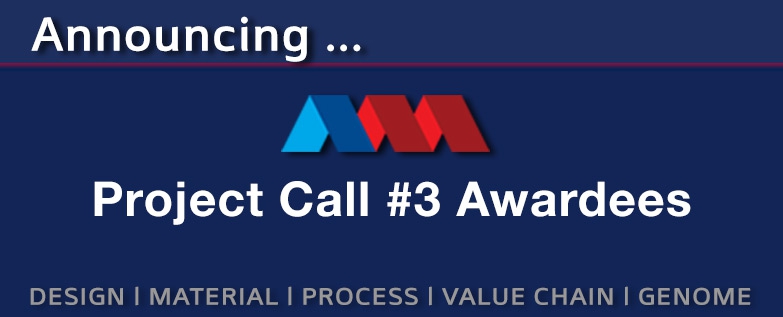The USA’s pilot institute dedicated to 3D printing, America Makes, is now in its third round of funding for industrial additive manufacturing projects. Led by the defense-focused National Center for Defense Manufacturing and Machining (NCDMM), America Makes will dole out $8 million to 9 awardees, with the awarded teams matching their own $11 million, totaling $19 million per project.
The initial project call in February sought applications to cover five areas of interest in the industry: design, material, process, value chain, and genome. Among the evaluators on the proposal committee board, Tim Caffrey, Senior Consultant at the leading consultancy Wohlers Associates, said of the submissions, “I was struck by both the total number of submissions and the high quality of the proposals. Specifically, the proposals demonstrated close alignment to America Makes’ mission and to its Technology Roadmap objectives, which is a testament to the maturity of the member proposal teams. The Institute is definitely operating and performing at an impressive level.”
Many of the projects awarded will seek to fill gaps between design software and 3D printers, as industrial CAD software has not yet been fully optimized for 3D printing parts. Others will work towards improving the efficiency and quality of machines themselves. The project that may be the most exciting is the development of a low-cost system for manufacturing electronics all within a single machine. As with all public-private partnerships, it will be interesting to see how these technologies are brought back into the public sphere, if it will be through protected patents and high-priced systems or freely-accessible public resources. One project worth noting in this regard is a GE Global Research project that seems to be at least partially open source.
While America Makes has a detailed rundown of the projects, below I’ve included a brief synopsis of each project, all set to begin this summer. If you’ve got the time, however, I suggest you head over to the America Makes site to read them in detail.
The projects being awarded:
- “Parametric Design of Functional Support Structures for Metal Alloy Feedstocks”: This project, led by University of Pittsburgh with participation from Johnson & Johnson, ITAMCO, and the University of Notre Dame, will work to develop parametic design solutions for automatically generating optimal support structures for Direct Metal Laser Sintering (DMLS).
- “Multidisciplinary Design Analysis for Seamless AM Design, Analysis, Build, and Redesign Workflows”: Raytheon will lead a team consisting of General Electric, Altair, ANSYS, Autodesk, NetFabb, the University of Wisconsin, and the Raytheon-University of Massachusetts Lowell Research Institute (RURI) to streamline the design process for engineers and technicians mass customizing products for 3D printing.
- “Economic Production of Next Generation Orthopedic Materials through Powder Reuse in AM”: A group led by the University of Notre Dame and made up of Case Western Reserve University, SCM Metal Products Inc., Zimmer Inc., and DePuy Synthes will work on optimizing batch production of orthopedic products by improving the ability to reuse powder in laser sintering machines, focusing on Ti-6Al-4V, stainless steel, and nylon.
- “Integrated Design Tool Development for High Potential AM Applications”: This project will see the development of a design software suite meant to expand CAD software for the ability to improve designs for 3D printing, accounting for manufacturability requirements and topology optimization. This project sees participation from ANSYS, United Technologies Research Center, Honeywell, Materials Science Corporation, Aerotech, ExOne, RTI International Metals, and the U.S. Army Aviation and Missile Research Development and Engineering Center, all led by the University of Pittsburgh.
- “A Flexible Adaptive Open Architecture to Enable a Robust Third-Party Ecosystem for Metal Powder Bed Fusion AM Systems”: GE Global Research will lead GE Aviation’s Additive Development Center, Rensselaer Polytechnic Institute, and low-cost metal printer startup MatterFab Corp to get powder bed fusion for additive manufacturing (PBFAM) up to standard for high-volume mission-critical component production. This will complement another GE America Makes project that seeks to develop open source protocol and software for the same technology.
- “Digital Threading of AM”: This project will attempt to cut the costs and time needed to create a 3D printed part by decreasing the amount of material used, post-processing required, and by increasing the automation of 3D printing. It will be managed by Boeing with Aerojet, Raytheon, ITI, and Stratonics, Inc.
- “A Design Guidance System for AM”: The Georgia Institute of Technology will lead a project with Siemens Corporate Technology, MSC, Senvol, Stratasys, The University of Texas at Austin, The University of Texas at Arlington, Lockheed Martin, GKN Aerospace, Woodward, Siemens Energy, and Siemens PLM to fill in gaps between design software and 3D printing systems.
- “Cyber-Physical Design and AM of Custom Orthoses”: The University of Michigan, overseeing Altair ProductDesign Inc. and Stratasys, will develop a software package for FDM 3D printing of ankle-foot orthoses that will create fill patterns, validate performance, and more.
- “A Low-cost Industrial Multi3D System for 3D Electronics Manufacturing”: The University of Texas at El Paso (UTEP), will manage a project with Northrop Grumman, Lockheed Martin, Boeing, Honeywell, and Draper Laboratory, to create a low-cost system for 3D printing electronics within a single machine.




